Tourism
Learning from the Lessons of the Doi Tung Project in Chiang Rai

Visitors at Doi Tung enjoy beautiful performances by the six ethnic minorities in Doi Tung: Akha, Lahu, Shan, Thai Lue, Lawa and Chinese.
–
CHIANG RAI – Italy’s Antonio Maria Costa has seen the transformative effect on local ethnic minorities of the Doi Tung project in the Thai highlands of Chiang Rai since he first visited 15 years ago.
The project is named after a 1,390-metre-high mountain close to the Thai-Myanmar border that lies in an area known as the “Golden Triangle” — one of Asia’s two leading opium-producing bases.
This royal-led initiative seeks to empower communities in the North and steer them away from the narcotics trade that is rampant in the region by helping them develop alternative sources of income.
After Mr Costa recently returned to this impoverished but scenically breathtaking area — and with Doi Tung now a national brand due to the success of the project — he wants to emulate and export its sustainable business model to Africa.
A veteran of the United Nations Office on Drugs and Crime (UNODC) with a firm grasp of alternative forms of development, Mr Costa has seen the social entrepreneurship efforts in the North flourish.
They have now grown to include agriculture, handicrafts and animal husbandry while the vegetation has become luscious. Tourism has boomed, creating a whole new industry for the local Thai communities.
As the non-governmental organisation (NGO) in Ivory Coast, western Africa that Mr Costa funds and mentors was finding it difficult to appreciate the different dimensions of long-term development projects, he decided to turn to Doi Tung for inspiration.
He invited a volunteer to visit Chiang Rai and see how the pet project of HRH the Princess Mother and the late King Bhumibol has blossomed since its inception 30 years ago, in a bid to take notes and learn from its success.
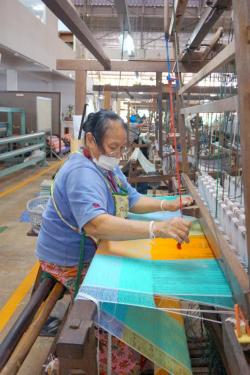
“Thailand is very lucky to have had a monarch who took such an active interest in helping the people. It’s very rare,” he told the Bangkok Post.
“The government was also active and committed and able to support what the people needed, and what the royal family hoped to accomplish.”
Mr Costa, also a trained economist, said he wanted to show the volunteer what gains can be achieved by involving local communities in their own development, a concept new to Africa, and helping them to avoid the temptation of abetting the drug trade.
He also praised the role of long-term commitment, “not commitment from above, of people giving money for development, but from below, particularly from involving people in the solution of their own problems”.
Mr Costa’s work at the UNODC put him in charge of drug-control programmes in various countries, tackling the supply and demand of narcotics as well as illicit crops and trafficking. This is how Doi Tung came into the picture.
“The UN recognised the uniqueness of the Doi Tung model, and sees it as an example to be emulated. It started as a single issue — fighting crime, drug trafficking, drug abuse. But over time it has changed the life of the community, not only in the northern part of Thailand but also in other parts of the country and in other countries,” he said.
“They did it in a unique way. At the UN, we facilitate with tools, money,” he said.
“The Doi Tung Development Project, however, sees development from the opposite side, creating participatory conditions for the people so they are not consumers of someone else’s income, but create their own income and invest in it. All this takes time. It’s a long process.”
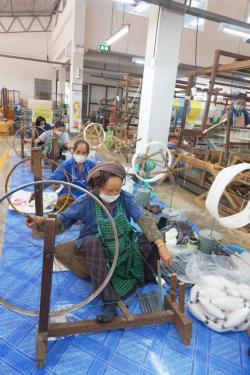
He said Doi Tung was fortunate due to the conducive conditions when the project began, with international resources pouring in from the United States and elsewhere, the dynamics of the world economy, and the nature and involvement of the Thai people.
Another factor was the role played by the royal family, which committed its resources, reputation and institutional responsibility to work with areas affected by drug problems and crime, he said.
The late King’s “development philosophy has been very simple in that it has not been the result of academic studies, but based on common sense and love for the people, and the ability to contribute to the people”, Mr Costa said.
The former monarch’s philosophy is “the best recipe for success in the long run — empowering people, making them aware that they hold in their hands their success rather than just rely on handouts”, he said.
Mr Costa hopes the UN will consider the importance of the Doi Tung model for other drug-affected regions, such as the problems with cocaine in Colombia, Bolivia and Peru, or opium in Afghanistan and Myanmar.
But these issues must also be tackled from the demand side in richer countries where the consumer markets for illegal narcotics are huge, he said.
After an early stint in academia, Mr Costa, who has an educational background in political science and mathematical economics, had a brilliant career with the UN. He was the first person to hold a double tenure as executive director of the UNODC — a position informally known as the “world’s drug czar” — after which he served as director-general of the United Nations Office in Vienna (UNOV) for two four-year terms.
While there he was assigned the job of supervising a major administration restructuring programme at the UN headquarters.
He also served as secretary-general of the European Bank for Reconstruction and Development (EBRD) at the European Union as EU director-general for Economics and Finance (DGII).
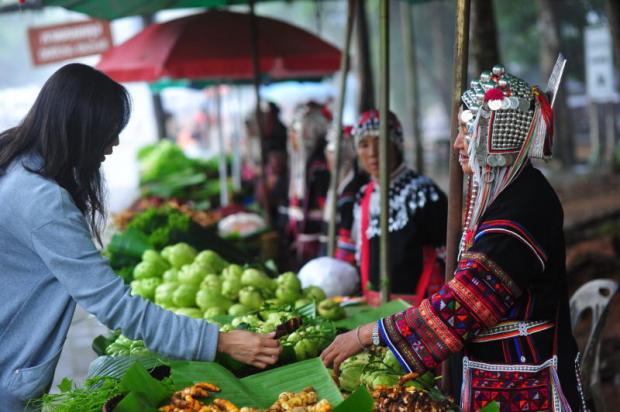
A shopper picks fresh produce farmed and sold by ethnic highlanders who have joined the Doi Tung development project in Chiang Rai
–
For his continuous contributions to raising awareness about drugs, and his influence on policy makers worldwide, Mr Costa was awarded the Nils Bejerot prize in 2010.
Though now retired, he has not been able to put his passion for development issues behind him.
Together with his wife Patricia he initiated his own family foundation which provides assistance to marginalised women and children in Africa, where he believes the greatest humanitarian crises exist today.
This was also a charity project that grew out of personal experience.
He and his wife adopted an African girl — one of their three adopted children — when she was one week old. With their support, she now has a family of her own, a doctorate degree and speaks five languages.
They realised how much human capital is wasted when children, especially girls, are not given the means to develop themselves.
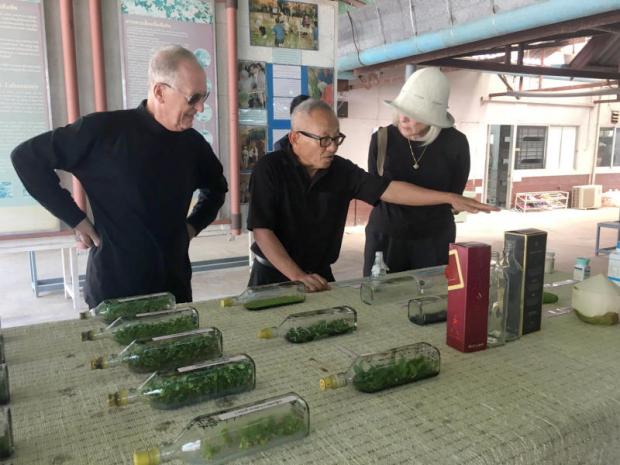
Antonio Maria Costa, left, and his wife, Patricia, right, visit the orchid nursery in Doi Tung. photo by Mae Fah Luang Foundation under Royal Patronage
–
His foundation is called the Africa Educational Fund, otherwise known as Moringa.
It provides aid mainly to people in Ivory Coast in three important areas: education for young girls; the identification of children whose births are not recorded, and therefore lose the right to go to school, travel and work; and the development of micro-financing for women’s groups through their own savings.
But Mr Costa has also spent a significant part of his career combatting drug production and related problems in Central and Latin America.
He says Colombia is one country now ripe for alternative development after a long-awaited peace agreement ended the decades-long conflict between the government and the Revolutionary Armed Forces of Colombia (FARC).
He said Thailand’s Mae Fah Luang Foundation under Royal Initiative — from which the Doi Tung project sprang — has been approached as a consultant on this matter.
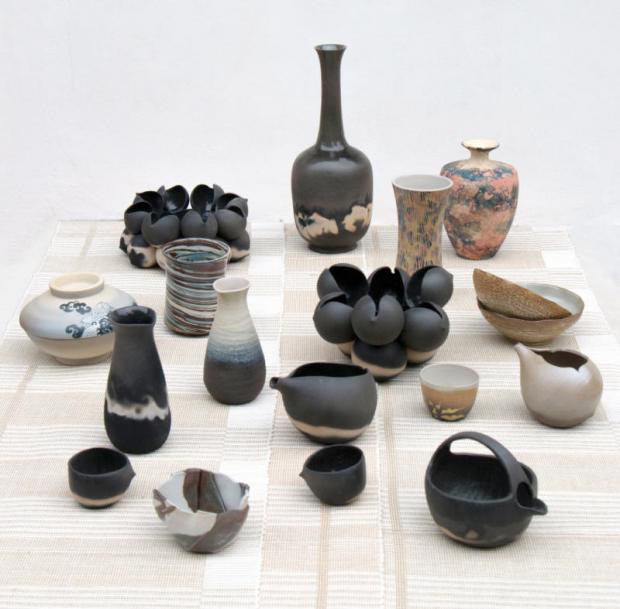
Some of the ceramic items created by Doi Tung hill tribe artisans. photo by Mae Fah Luang Foundation under Royal Patronage
-
He feels Colombia has much to learn from Doi Tung. The South American nation has peace, a respected leader — President Juan Manuel Santos was awarded the Nobel Prize in 2016 — and resources are pouring in, making it an ideal testing ground.
Yet he acknowledges the Doi Tung model may face challenges when applied to countries like Myanmar and Afghanistan, where the context that supports the King’s development concept including peace, a dynamic economy and a responsible leadership, is lacking.
Moreover, drug production is just one part of a vicious cycle, Mr Costa said, citing Mexico as an example.
Although the amount of drugs produced there is very small, Mexico is a major drug trafficking hub with rampant corruption at state levels that allows organised crime and drug trafficking to flourish.
He stressed the importance to the drug trade of the role played by “white collar collaborators”, something he highlights in his novel “The Checkmate Pendulum” which weaves together his 40 years of experience in politics, finance and crime.
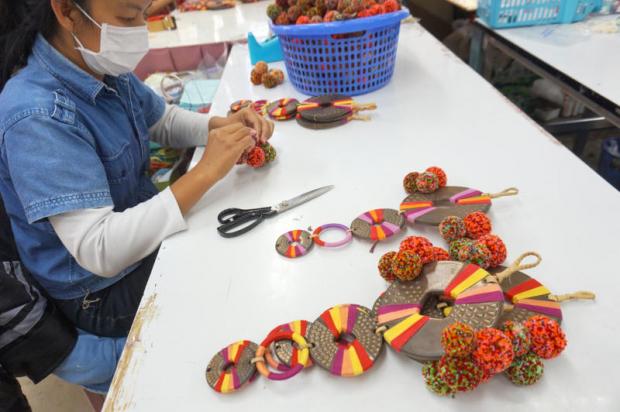
–
“There is a huge amount of money created by the drug cartels that is being recycled by the banks of New York and London,” he said.
“Take the case of Wachovia Bank. It was the 5th- or 6th-largest bank in New York. In 2010, it was accused by the federal government in the US of recycling US$436 billion (14.85 trillion baht) for the Sinaloa cartel,” he said.
“They were blamed for that [but] they were not put in prison, they were not dismissed [and] their fine was 2% of their profit that year,” he added.
“Where is the war against drugs? If you want to win a war, you’d be serious with bankers, the local authorities, and with those who perpetrate the drugs.”
By USNISA SUKHSVASTI
Bangkok Post
Tourism
Interior Ministry Introduces New 180 Day Destination Thailand Visa

People from more nations will be now able to enter Thailand without a visa beginning Monday. This is part of an effort to increase tourism and encourage visitors to stay longer, Interior Ministry spokeswoman Traisuree Taisaranakul said on Friday.
According to Ms. Traisuree, Interior Minister Anutin Charnvirakul has signed four documents that will make it easier for foreigners to travel. These modifications will all take effect on Monday, provided they are published in the Royal Gazette.
The instructions include 93 more nations on the list of individuals who can visit Thailand without a visa, up from 57 previously. People from these countries can stay for a maximum of 60 days. Additionally, from 19 to 31, nearly twice as many nations will be able to obtain visas on arrival in Thailand.
To attract digital nomads, artists, and tourists interested in learning or practicing skills such as cooking and Muay Thai, the country will also introduce the Destination Thailand Visa service.
The new form of visa, which is valid for five years, allows travelers to stay for up to 180 days.
According to Ms. Traisuree, students holding visas for master’s degrees or higher will not be required to leave Thailand immediately upon graduation. They will be able to stay for an additional year to hunt for work or vacation.
In order to enhance the economy and tourism, the cabinet took a general decision on these additional measures in May. The statement was meant to be released in June, but it was pushed back.
Ms. Traisuree believes that this is the greatest sort of visa for persons who want to work from home in the Land of Smiles and explore the nation without the various restrictions and complications that come with conventional tourist visas.
Getting a DTV will give you a 5-year multiple-entry visa that lets you stay in Thailand for a total of 180 days a year, with the opportunity to stay for another 180 days.
Ms. Traisuree said that the Destination Thailand Visa is great if you want to work from home in the Land of Smiles and see the sights without the many restrictions and problems that come with a regular tourist visa. The Destination Thailand Visa will cost 10,000 THB.
Qualifications for the Thailand Destination Visa (DTV)
According to Thai Embassy, to be eligible for the visa, you must fulfill the following conditions (which could change):
- You have to be 20 years of age or older
- You have to be able to afford the cost of the visa
- To sustain your stay in the nation, you must demonstrate that you have at least 500,000 THB in your bank account
- Proof of your employment with a recognized company is required.
For digital nomads or remote workers who want to make the most of their travels and yet have the opportunity to work while they’re there, the Destination Thailand Visa is designed just for you. Additionally, it is ideal if you are traveling to Thailand in order to partake in any of the following activities:
- Thai food prepared with Muay Thai
- Instruction and conferences
- Sports medicine therapy
- International talent International music and art events
Thailand DTV Visa Benefits
Additionally, there is uncertainty about these details and they could change:
- In comparison to other Southeast Asian nations that provide comparable visas, Thailand has less stringent income requirements and charges for the visa. For another 10,000 THB, you can extend the visa once, for a maximum of 180 days.
- There are ninety-three foreign nations that qualify for the Thailand DTV Visa.
- With this visa, you can lawfully operate remotely for foreign clients and companies while in Thailand.
- Your spouse and any children under the age of twenty may accompany you.
- You are exempt from paying taxes on your foreign income because the visa allows you to stay in Thailand for up to 180 days.
Drawbacks of a Thailand DTV Visa
You are unable to work for a Thai company that needs a Thai work visa, even though you are still able to engage in some activities and make money. Your DTV will end if you decide to change the kind of visa you are currently on.
Additional information on the visa’s release date and application process will be available in late June or early July of 2024. You will most likely be able to apply for it via the Thai immigration office, a Thai embassy, or a Royal Thai Consulate.
Tourism
Hotels in Thailand Fret as German Itravel Group Files for Bankruptcy

Thailand’s Hotels Association (THA) reports that another German tour operator has gone bankrupt, but that this will have a far less effect than the recent bankruptcy of FTI Touristik.
Following notification from the Tourism Authority of Thailand (TAT), the Thai Hotels Association has now confirmed that the Cologne-based luxury tour operator Itravel Group has formally filed for bankruptcy.
Southern Thailand is home to numerous high-end resorts, which Itravel aims to attract, according to Thai Hotels Association president Thienprasit Chaiyapatranun.
As a result of Itravel’s bankruptcy, he said, the hotels association is currently collecting data from its members.
On Monday, the organization wrote to the TAT and the Foreign Ministry, requesting that they assist hotel operators in keeping up with legal developments surrounding the bankruptcy of the German tour operator FTI, which resulted in a loss of almost 111 million baht for hotels around the country.
Hotels having issues with Itravel
On Monday, during the THA monthly meeting, Mr. Thienprasit noted that they also emphasized the case’s urgency to Minister Sermsak Pongpanit of Tourism and Sports.
In response to allegations that hotel operators with business partnerships with Itravel were experiencing issues with financial transactions, the agency issued an alert to the industry, according to Siripakorn Cheawsamoot, TAT deputy governor for Europe, Africa, the Middle East and the Americas.
He speculated that the losses might be lower with Itravel, an online travel agency that focuses on the niche luxury market, than with FTI, the third operator.
According to the Bangkok Post, at Monday’s THA meeting, Mr. Sermsak stated that the ministry will look into measures to assist hotels, especially since the goal of 3.5 trillion baht in tourism earnings for this year is still very ambitious.
According to Mr. Thienprasit, the organization is opposed to the government’s plans to increase the legal foreign ownership of condominiums from 49% to 75%. This, he added, might lead to an increase in unlawful accommodations and make other condo residents feel uneasy about having more guests around the clock.
Unscrupulous investors
He said that some international investors are already breaking the law by renting out their rooms to day guests, even though the Hotel Act only permits rentals of at least 30 days.
An increase in the foreign ownership quota for condos, according to Mr. Thienprasit, could entice unscrupulous investors and lead to the construction of even more unlawful rooms, which now exceed the number of registered hotel rooms by a factor of two.
The success of Thailand’s hotel industry is highly dependent on the business of tour operators. These collaborations bring in a constant flow of visitors, particularly during busy seasons.
It is more convenient for passengers to book comprehensive packages offered by tour operators, which include hotel accommodations and activities. Because of this arrangement, hotels may anticipate a specific amount of bookings without having to spend a lot on advertising.
Additionally, hotels are able to provide more affordable rates, which appeals to guests who are mindful of their budget. But if tour operators go through slumps or start focusing on other places, this dependence might be disastrous.
Source: Bangkok Post, Thai PBS
Tourism
Embracing Paradise: Your Guide to an Unforgettable Vacation in Los Cabos

Nestled at the southern tip of the Baja California Peninsula, Los Cabos emerges as a paradise where the desert meets the sea, offering a unique blend of natural wonders, luxurious accommodations, and vibrant culture. Whether you seek serene relaxation, thrilling adventures, or cultural explorations, Los Cabos promises an idyllic escape that exceeds expectations.
Discovering Pristine Beaches
Los Cabos is renowned for its stunning beaches, each with its own charm and allure. Sink your toes into the soft sands of Medano Beach, a bustling stretch perfect for sunbathing and people-watching. For a more secluded experience, explore the rugged beauty of Santa Maria Beach, ideal for snorkeling amidst vibrant marine life in crystal-clear waters. Enhance your beach experience with guided tours and snorkeling excursions offered by https://boattripsloscabos.com/, where you can explore the coastline and underwater wonders with expert guides.
Embarking on Aquatic Adventures
Venture into the azure waters of the Sea of Cortez and Pacific Ocean for thrilling water activities. Dive into snorkeling or scuba diving expeditions to discover underwater treasures like colorful coral reefs and curious sea creatures. Set sail on a whale-watching tour during the winter months to witness majestic humpback whales breaching against the backdrop of the Pacific horizon.
Exploring the Baja Desert
Beyond its pristine coastline, Los Cabos boasts dramatic desert landscapes waiting to be explored. Take an ATV or jeep tour through the rugged terrain of the Baja desert, where towering cacti and unique rock formations paint a striking contrast against the deep blue sky. Visit the Sierra de la Laguna Biosphere Reserve for hiking trails that lead to hidden oases and panoramic vistas of the surrounding desert.
Indulging in Culinary Delights
Los Cabos is a culinary paradise, offering a fusion of traditional Mexican flavors with international influences. Sample fresh seafood tacos at local taquerías or dine on gourmet cuisine crafted by world-renowned chefs at upscale restaurants overlooking the ocean. Savor authentic Baja cuisine with dishes like fish tacos, ceviche, and grilled octopus paired perfectly with locally produced wines and craft cocktails.
Experiencing Vibrant Nightlife
As the sun sets, Los Cabos transforms into a lively nightlife destination. Explore the vibrant nightlife scene in Cabo San Lucas with its array of beachfront bars, live music venues, and pulsating nightclubs. Dance the night away under the stars or enjoy a sunset cocktail overlooking the marina, where the atmosphere buzzes with energy and excitement.
Relaxing in Luxury Resorts
Los Cabos boasts a plethora of luxurious resorts and boutique hotels that cater to every traveler’s desire for relaxation and indulgence. Unwind in infinity pools with panoramic ocean views, rejuvenate with holistic spa treatments inspired by ancient Mexican traditions, or tee off on world-class golf courses designed by golf legends amidst stunning coastal landscapes.
Immersing in Local Culture
Immerse yourself in the rich cultural heritage of Los Cabos with visits to historic landmarks like the Mission San Jose del Cabo Church or art galleries showcasing local and international artists. Browse through vibrant markets selling handmade crafts, textiles, and souvenirs, or attend cultural festivals and events celebrating Mexican traditions, music, and dance.
Planning Your Los Cabos Escape
Whether you’re planning a romantic getaway, a family vacation, or a solo adventure, Los Cabos offers a perfect blend of relaxation, adventure, and cultural immersion. With its breathtaking landscapes, diverse activities, and warm hospitality, Los Cabos ensures a memorable vacation that leaves you rejuvenated and inspired, promising a return to its paradise shores time and again.
SEE ALSO: Thailand Named Top Spot for Most Popular Tourist Destination
-

 News3 years ago
News3 years agoLet’s Know About Ultra High Net Worth Individual
-
Entertainment1 year ago
Mabelle Prior: The Voice of Hope, Resilience, and Diversity Inspiring Generations
-

 Health3 years ago
Health3 years agoHow Much Ivermectin Should You Take?
-

 Tech2 years ago
Tech2 years agoTop Forex Brokers of 2023: Reviews and Analysis for Successful Trading
-

 Lifestyles2 years ago
Lifestyles2 years agoAries Soulmate Signs
-

 Health2 years ago
Health2 years agoCan I Buy Ivermectin Without A Prescription in the USA?
-

 Movies2 years ago
Movies2 years agoWhat Should I Do If Disney Plus Keeps Logging Me Out of TV?
-

 Learning2 years ago
Learning2 years agoVirtual Numbers: What Are They For?
